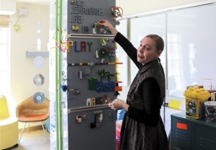Recent News
Not your mother’s nanomedicine: NIH grant targets safer medication for women
October 20, 2025
AI tensor network-based computational framework cracks a 100-year-old physics challenge
September 16, 2025
Postdoctoral research fellow wins 1st place in conference poster presentation
August 25, 2025
Engineering a new treatment for ovarian cancer
June 24, 2025
News Archives
UNM professor receives NSF Early Career award award for research on teaching
March 7, 2018 - Danielle Prokop, freelance reporter with the Daily Lobo
 At the University of New Mexico students learn a lot of vital skills — for one UNM faculty member, the process of learning also matters.
At the University of New Mexico students learn a lot of vital skills — for one UNM faculty member, the process of learning also matters.
Assistant Professor Vanessa Svihla was awarded $516,000 by the National Science Foundation to develop better frameworks for teaching design and engineering that mirrors real-world situations.
Her original research project, “Framing and Reframing Agency in Making and Engineering,” received the NSF CAREER Award. Research began Jan. 1 and is funded through 2022.
The NSF describes the award on its website as “most prestigious awards in support of early-career faculty who have the potential to serve as academic role models in research and education.”
Svihla is a learning scientist, who studies how people learn and specifically how they develop designs to solve problems. Her work is often focused on engineering but applies across academia.
Her FRAME project has two parts: first, challenging the current model of teaching a single solution to a problem set and second, supporting students to better learn design.
“It’s pretty widespread,” Svihla said about the model. “A lot of the experiences in K-12, and even a lot of college courses, there’s a single right answer that’s known ahead of time. And life isn’t like that.”
Svihla’s previous NSF-funded project, FACETS — Formation of Accomplished Chemical Engineers for Transforming Society — complements her current work.
The FACETS project aimed to take non-traditional experiences and cultivate problem solving in students. Svihla illustrated an example of the gulf between students from different economic backgrounds and how they view a butter knife.
“If you’re from a well-resourced family and ask, ‘What’s a butter knife for?’ you get the answer, ‘Spreading butter,’” Svihla said. “But if you come from a low-economic background where you have to make it work and make do, like our students, (you may) have a lot of other responses, ‘screwdriver,’ ‘a putty knife,’ ‘a car handle.’”
Svihla says this problem solving or previous work experience is not cultivated in academia, which leaves students behind.
“We’re not helping students see that as valuable experience,” Svihla said. “We’re not necessarily building on that and letting them have opportunities to see that they have a foundation that can make them very successful.”
Svihla said building the frameworks to better teach students to learn design comes from a strong foundation encouraging students’ problem solving and ingenuity.
“One of the things we’re doing is trying to understand the assets our students bring so that we can build on those,” Svihla said. “We can’t really develop those better resources until we have a better understanding of what that experience looks like for students.”
She teaches classes in Organization, Information and Learning Sciences, or OILS, and co-teaches freshman Chemical Engineering with Professor Abhaya Datye.
While Svihla implements her research in her classes, she wants to emphasize that encouraging students is her focus.
“I am passionate about research, but I also want to have an impact,” Svihla said. “A lot of what’s driving this is I often see our students bringing strengths so they know to engage them.”
